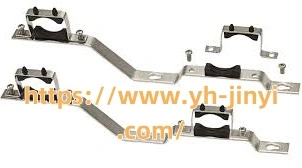Related Blogs
What Makes a JINYI Manifold Bracket Ideal for Industrial Projects
3 minutes, 53 seconds
-4 Views 0 Comments 0 Likes 0 Reviews

A Manifold Bracket plays an essential role in mechanical and industrial systems by supporting and securing pipelines, valves, or connections that regulate the flow of gases and liquids. When choosing the right bracket, understanding the structural, environmental, and performance requirements is key to achieving reliable operation. Selecting a model that aligns with your system's configuration can reduce vibration, prevent leaks, and ensure stability throughout long-term use.
Before making a purchase, it is important to assess the load-bearing requirements of your setup. The bracket should have adequate strength to support the connected components without deformation or misalignment. Material selection also matters—metals like stainless steel or aluminum are often used because of their corrosion resistance and durability. The working temperature and pressure of the environment should guide your decision to ensure compatibility with your application.
Installation convenience is another major factor. A well-designed bracket allows for straightforward mounting and easy maintenance access. Some systems require adjustable fittings, so choosing a model with flexibility in design can save time during installation or when making modifications. In contrast, a fixed design may suit more stable, unchanging systems where precise alignment is required.
JINYI focuses on structural integrity and efficient engineering when developing its products. The design emphasizes ease of installation and stable load distribution. A properly aligned bracket not only improves performance but also prevents uneven stress that could cause premature wear or failure. For users managing complex systems, this consideration can make a significant difference in long-term maintenance and safety.
Another consideration is surface treatment and protection. Coated or polished surfaces reduce wear and prevent corrosion from moisture or chemicals in industrial environments. Choosing the right coating depends on the type of fluid or gas handled and the surrounding conditions. This small detail often determines the product's durability over time.
In addition, evaluating compatibility with other components is crucial. The spacing, hole size, and connection points must match the equipment specifications. A mismatch can lead to assembly difficulties or affect the accuracy of system flow control. Reviewing technical drawings or consulting installation guidelines before purchasing can help avoid such issues.
When working with reliable manufacturers like JINYI, customers gain access to consistent quality and engineering support. The brand's experience in producing structural and precision components ensures dependable solutions for different projects. Whether used in a compact machine or a large industrial installation, proper selection always leads to smoother performance and reduced downtime.
As technology evolves, many manufacturers focus on designs that improve efficiency and service life while reducing maintenance needs. Considering both functional and economic factors will help buyers make a more informed decision. A well-chosen bracket serves as a foundation for system reliability and efficient operation in the long run.
For more product details and design references, visit https://www.yh-jinyi.com/product/






Share this page with your family and friends.